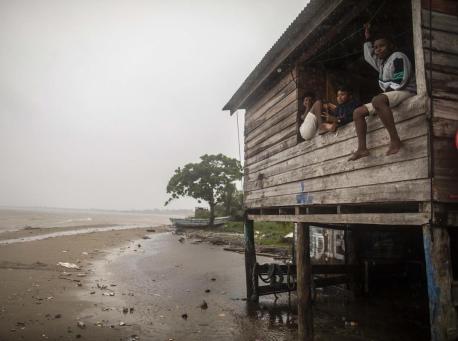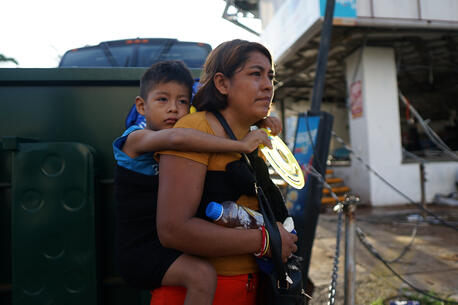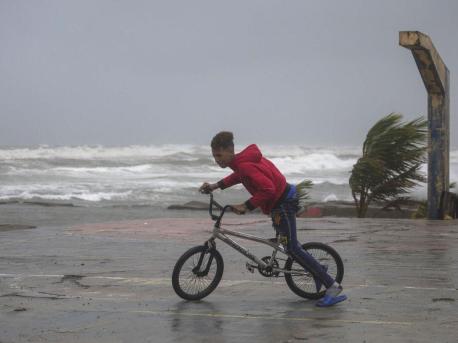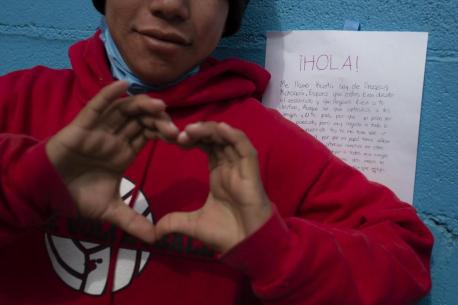
Hurricane Iota Batters Central America
Already reeling from Hurricane Eta just two weeks ago, children and families in the region are now struggling to recover from a second devastating storm. UNICEF is working with partners to rush lifesaving supplies and humanitarian support to the most vulnerable.
Hurricane Iota made landfall as a Category 4 storm on Monday night, November 16, near the town of Haulover, Nicaragua, bringing heavy rainfall leading to life-threatening flash floods and mudslides in parts of Honduras, Nicaragua, Guatemala, Belize, El Salvador, Costa Rica and Panama.
While #Iota's winds are lower, the #hurricane still has the potential to produce potentially catastrophic effects from flash flooding and mud slides over central America. Here are the Tuesday morning Key Messages for Iota. The full advisory is at https://t.co/tW4KeFW0gBpic.twitter.com/zJT8HfRVp2
— National Hurricane Center (@NHC_Atlantic) November 17, 2020
Just weeks ago, Hurricane Eta caused massive damage across seven countries
The region is still reeling from Hurricane Eta, a deadly, slow-moving storm that slammed into Puerto Cabezas, Nicaragua, just 15 miles south of Haulover, on November 3 and lingered for days, causing massive damage across seven countries and affecting at least 3.3 million people, including 1.2 million children.

Evacuated people remain in a shelter in Bilwi, Puerto Cabezas, Nicaragua, on November 16, 2020 as Hurricane Iota moves over the Caribbean towards the Nicaragua-Honduras border. © UNICEF/UN0366487/AFP
Hurricane Iota is the 30th named storm of this year's punishing Atlantic hurricane season
UNICEF and partners are working to reach children and families with emergency supplies and humanitarian assistance. The extent of the damage caused by Hurricane Iota is still being assessed; access to some of the affected areas remains challenging. “We thought Hurricane Eta was bad, but Hurricane Iota may end up being even worse for children in Central America,” said Bernt Aasen, UNICEF Regional Director, a.i., for Latin America and the Caribbean.
“It’s one hurricane after the other, but stronger each time. In less than two weeks, the same communities have been slammed twice and are still inundated. The hurricane season is not over and water has yet to recede. The humanitarian needs of families and children are immense and keep growing day by day.”
UNICEF and partners are rushing emergency supplies and humanitarian support to families most in need
In the days and hours after Hurricane Eta, UNICEF and partners across Central America immediately began delivery of lifesaving supplies and humanitarian support to families most in need.
- In Honduras, over 10,000 children are benefiting from improved conditions in shelters, including through the provision of mental health support and lifesaving supplies; 4,500 vulnerable families are receiving in-kind social transfers by local governments, with UNICEF support; and 5,000 people in shelters have been reached with key water, sanitation and hygiene (WASH) items and services, including menstrual hygiene supplies.
- In Nicaragua, UNICEF donated WASH supplies that are being distributed by authorities, aiming at benefiting 15,000 families. More than 34,000 people have been reached with disease prevention messages. An additional 6,000 families received hygiene kits, and 600 kits for psychosocial support in shelters are being procured to be delivered in the coming days.
- In Guatemala, through authorities, UNICEF is distributing 1,900 personal hygiene kits, providing logistical support to teams deployed to monitor the situation of health services, and disseminating prevention messages via community radio in local languages. Water treatment plants were made available in affected municipalities.
- In Belize, UNICEF is providing supplies for affected communities, including education kits to 120 families, PPE, blankets and bed sheets, and plastic tarpaulins.
UNICEF needs more funding to continue its lifesaving work across the region
Potential overcrowding in shelters is an urgent concern because of the heightened risk of disease transmission, including COVID-19. “Children who survived both hurricanes are now at risk of dying from waterborne and other infectious diseases,” said Bernt Aasen. “Cases of hepatitis and malaria have already been reported in some shelters. In addition, persistent rainfall and COVID-19 movement limitations hinder our humanitarian access to some of the most affected areas. We urgently need more resources to deliver lifesaving assistance to the children worst hit by the storms.”
UNICEF requires $42.6 million to reach more than 646,000 people, including 327,000 children, with lifesaving supplies and services in the most affected areas in Belize, Guatemala, Honduras and Nicaragua.
Top photo: On November 2, 2020, children sit on a beach house window ledge as Hurricane Eta approaches in Bilwi, Puerto Cabezas, Nicaragua. A second storm, Hurricane Iota, made landfall just 15 miles away on November 16. © UNICEF/UN0358879/Ocon/AFP
HOW TO HELP
There are many ways to make a difference
War, famine, poverty, natural disasters — threats to the world's children keep coming. But UNICEF won't stop working to keep children healthy and safe.
UNICEF works in over 190 countries and territories — more places than any other children's organization. UNICEF has the world's largest humanitarian warehouse and, when disaster strikes, can get supplies almost anywhere within 72 hours. Constantly innovating, always advocating for a better world for children, UNICEF works to ensure that every child can grow up healthy, educated, protected and respected.
Would you like to help give all children the opportunity to reach their full potential? There are many ways to get involved.





